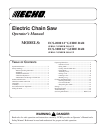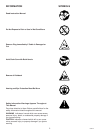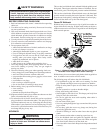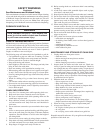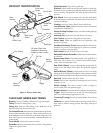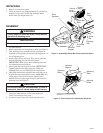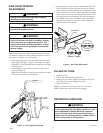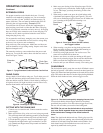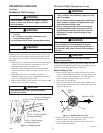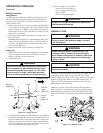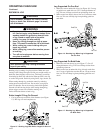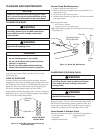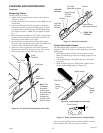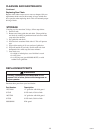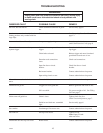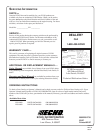
8
102514
EXTENSION CORDS
Use proper extension cord with this chain saw. Use only
extension cords marked for outdoor use. Use an extension
cord no less than 1.5 mm
2
(14SWG) at distances up to 30
meters (100 feet). The cord must be marked with suffix W
following the cord type marking.
Example
: SJTW
To reduce the risk of electric shock, this equipment has a
polarized plug (one blade is wider than the other). The plug
will fit in a polarized extension cord only one way. If the plug
does not fit fully in the extension cord, reverse the plug. If it
still does not fit, obtain a polarized extension cord. Do not
change the plug in any way.
Use an extension cord heavy enough to carry the current your
saw will draw. An undersized cord will cause a voltage drop
at the saw, loss of power, and overheating.
Keep cord away from cutting area. Make sure cord does not
catch on branches or logs during cutting. Inspect cords often.
Replace damaged cords.
The extension cord may come undone from the power cord
during use. To avoid this, make a knot with the two cords as
shown in Figure 7 below.
4. Make sure your footing is firm. Keep feet apart. Divide
your weight evenly on both feet. Stand slightly to left side
of saw. This keeps your body from being in direct line
with chain.
5. When ready to make a cut, press in switch lockout with
right thumb and squeeze trigger (see Figure 9). This will
turn saw on. Releasing trigger will turn saw off. Make sure
saw is running at full speed before starting a cut.
Figure 8 - Pressing Oil Cap to Oil Chain
Extension
Cord
Figure 7 - Tying Extension Cord and Power Cord in Knot
Figure 10 - The chain brake quickly stopping the saw chain
STOP
Trigger
Figure 9 - Front Hand Guard, Switch Lockout,
and Trigger Location
Front Hand
Guard
Switch
Lockout
6. When starting a cut, place moving chain against wood.
Hold saw firmly in place to avoid possible bouncing or
skating (sideways movement) of saw.
7. Guide saw using light pressure. Do not force saw. The
motor will overload and can burn out.
8. Remove saw from a cut with saw running at full speed.
Stop saw by releasing trigger. Do not use the chain brake.
Make sure chain has stopped before setting saw down.
9. Practice until you can maintain a steady, even cutting rate.
OILING CHAIN
Always check oil level before using saw. To oil chain, press oil
cap. Oil will feed onto guide bar and chain. Press oil cap at
least once before each cut. Check oil level often by looking at
oil sight level hole. Oil sight level hole is on left side of saw,
between front handle and front hand guard.
CUTTING WITH THE CHAIN SAW
1. Connect saw to extension cord. Connect extension cord to
power supply.
2. Make sure section of log to be cut is not laying on ground.
This will keep chain from touching ground as it cuts through
log. Touching ground with moving chain will dull chain.
3. Use both hands to grip saw. Always use left hand to grip
front handle and right hand to grip rear handle. Use firm
grip. Thumbs and fingers must wrap around saw handles
(see Figure 9).
To reset chain brake, release trigger and move front hand
guard back into position. You must release trigger first. If not,
the saw will start when you reset the front hand guard.
CAUTION: Do not use the chain brake to stop and start
your saw. Quick repeated stops may cause overheating
of the chain brake. Damage to the chain brake will
occur.
Note:
Test chain brake before each use. Firmly grip saw with
both hands. With saw running, move front hand guard forward
with back of left hand. Keep both hands on the handles. Saw
chain should stop. If chain brake does not work, have saw
repaired by authorized service person.
CHAIN BRAKE
The chain brake quickly stops the saw chain. Kickback causes
the back of operator’s left hand to contact front hand guard (see
Figure 10). When front hand guard moves forward, the saw chain
stops. This reduces the chance of serious injury during kickback.
When the chain brake activates, release trigger at once.
Chain Saw
Power Cord
OPERATING CHAIN SAW
Continued



